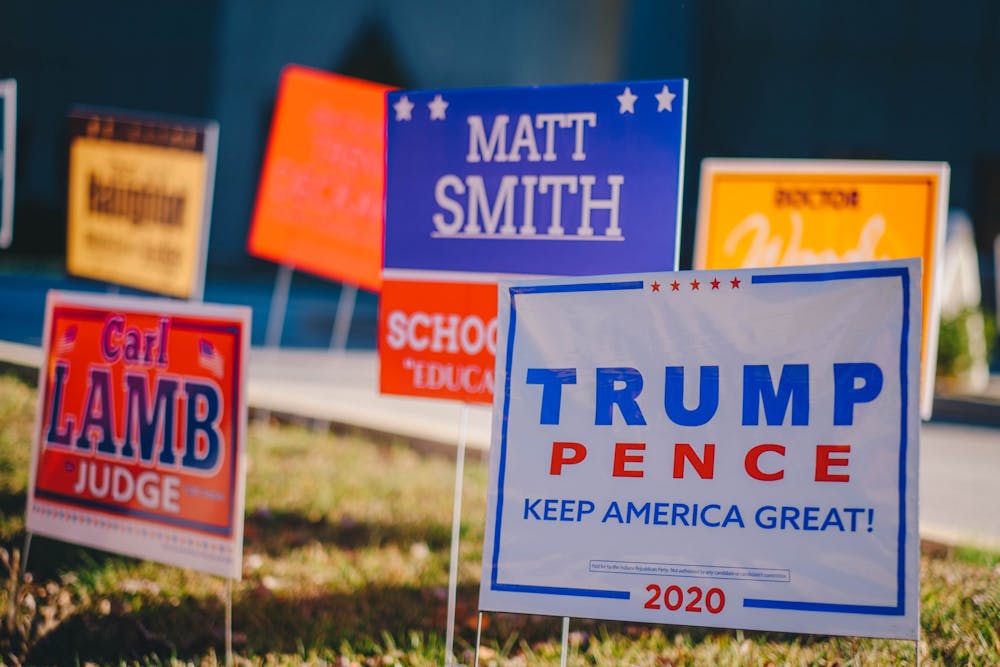Elizabeth Rowray had been approached many times to run for state office, but this year was different. Someone needed to step up and take the place of her district’s state representative, Democrat Melanie Wright, because she was not able to amply represent her district on the floor, Rowray said.
The Indiana State House of Representatives is a Republican supermajority. Therefore, there are enough Republicans, and few enough Democrats, that the Republican representatives could meet and vote without Democrats present. This meant Wright was not heard as often in legislative proceedings.
Rowray wanted to make sure District 35 was represented, so she decided to run. She won.
Rowray is one of five newly-elected Republican state representatives who beat Democrat incumbents this year. Only one Democrat beat a Republican incumbent. These seat acquisitions for the Indiana Republican party are a part of a continuing trend that is slowly turning Indiana into an even more Republican state, IU political science professor Gerald Wright said.
Wright said these seat flips were also made possible because the Indiana Republican party is better funded and more organized than the Indiana Democratic party.
The Indiana Republican party was Rowray’s biggest financial supporter this year. Rowray said it was harder to fundraise and campaign this year because of the COVID-19 pandemic. Many of her originally scheduled events, such as fundraisers, were canceled.
“It was hard to get your name out there and have people know you when you’re not able to get out to the fairs, you’re not able to do fundraisers in people’s homes,” Rowary said. “That’s really a difficult thing for someone who’s not the incumbent.
Rowray said the majority of her campaign was phone calls, direct mailing and some door knocking. For the door knocking, she said she would wear a mask, knock on the door, walk about 20 feet back and wait for someone to answer the door.
She was also able to do one outside in-person fundraising event in October and two parades — one in September in Frankton, Indiana, and the other on Halloween in Daleville, Indiana.
Marjorie Hershey, IU professor of political science, said she believes the Republican campaigns may have been more successful overall because they did more campaign practices such as door knocking than the Democratic candidates did.
Another reason more Republican candidates beat more incumbents is because in presidential elections the presidential race is more tightly tied to the state legislative races, Wright said. This relationship between these two votes has also grown stronger in recent years.
“In recent elections there has been a tighter bond between how people feel about the president and how they vote all the way down to the state house,” he said. “Those decisions used to be more independent than they are now.”
Hershey said the majority of people vote straight tickets in most years now.
While the Republican supermajority probably was not a factor for people voting, it does matter after the election because the Indiana state legislative body creates the new districts based on the 2020 Census, Hershey said. This overwhelming majority could allow the Republicans to gerrymander the districts in a way that will ensure more Republicans will be elected in the future, she said.
Hershey said Democrats were trying to gain more state legislative seats, at least in other states where the majority could have been overturned, so they could have their opportunity to gerrymander like the Republicans had in 2010.
“The Democrats did do better than they did in 2010, which wouldn’t have been hard, but they still were not able to gain a lot in the way of state legislative seats," she said.
Wright said the states have to redraw their lines every 10 years based on the census to make the population about equal in each district. While the Indiana legislature redraws the lines, some other states use independent groups to redraw these lines so as to prevent partisan gerrymandering, he said.



